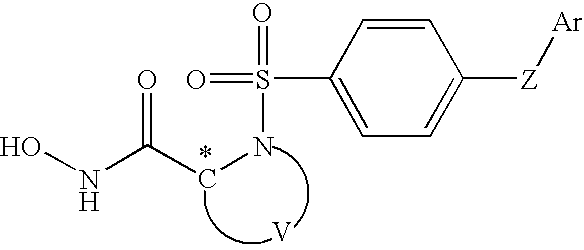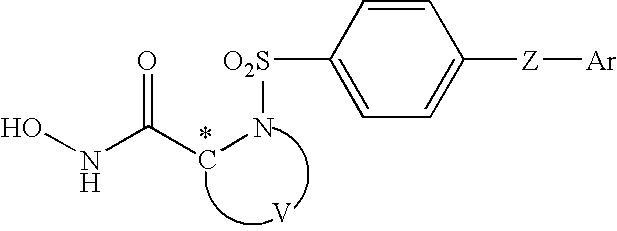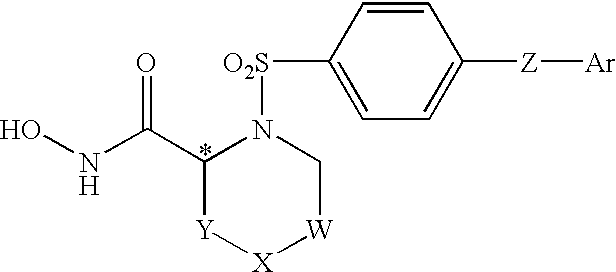Metalloproteinase inhibitors, pharmaceutical compositions containing them and their pharmaceutical uses, and methods and intermediates useful for their preparation
a technology of tnf- and inhibitors, applied in the field of compounds, can solve the problems of cachexia and anorexia, uncontrolled breakdown of extracellular matrix, and accumulation of excess tnf-, and achieve the effects of reducing the risk of cancer
- Summary
- Abstract
- Description
- Claims
- Application Information
AI Technical Summary
Problems solved by technology
Method used
Image
Examples
example 1
Process for the Preparation of 3(S)-N-hydroxy-4-(4-((pyrid-4-yl)oxy)benzenesulfonyl)-2.2-dimethyl-tetrahydro-2H-1,4-thiazine-3-carboxamide
1(a) Via the Intermediate 3(S)-dimethylthexylsilyl 2,2-dimethyl-tetrahydro-2H-1,4-thiazine-3-carboxylate
Step 1. Preparation of 4-Phenoxypyridine
Phenol (2.82 kg, 30.0 mol) was heated to 50° C. and 4-chloropyridine hydrochloride (1.5 kg, 10.0 mol) was added. The resulting solution was heated at 150° C. for 15 hours. The dark amber solution was cooled to 25° C. then poured into 3 M aqueous sodium hydroxide (16 L). The aqueous was extracted with dichloromethane (3×4 L). The combined organic was washed with 1 M sodium hydroxide (2×4 L), water (4 L), and brine (4 L) then dried over sodium sulfate and filtered. The solvent was removed under vacuum and the residual oil was dissolved in hexanes (6 L). The mixture was cooled to −60° C. with stirring and the resulting solid was collected by filtration and dried to give 1.1 kg of 4-phenoxypyridine (64% yield)...
example 1 (
EXAMPLE 1(d)
Via Allyl 3(S)-2,2-dimethyl-tetrahydro-2H-1,4-thiazine-3-carboxylate
Step 5a. Preparation of ally 3(S)-2,2-dimethyl-tetrahydro-2H-1,4-thiazine-3-carboxylate 7
A 50 mL flask was equipped with heating mantle, Dean-Stark trap, and reflux condenser and charged with 3(S)-2,2-dimethyl-tetrahydro-2H-1,4-thiazine-3-carboxylic acid 11 (0.87 g, 0.005 mol). To this was added benzene (20 mL), p-toluenesulfonic acid monohydrate (0.856 g, 0.0045 mol), and sulfuric acid (0.14 mL, 0.0025 mol). The reaction was refluxed for 16 hours to give an amber solution while 0.2 ml of water was azeotroped. Heating was removed, and the reaction was poured into water (25 mL). The aqueous layer was separated and combined with methylene chloride (25 mL). The pH was adjusted from 1 to 9 with 1 N sodium hydroxide solution. The organic was dried and the solvent removed under vacuum to give allyl 3(S)-2,2-dimethyl-tetrahydro-2H-1,4-thiazine-3-carboxylate as a colorless oil (0.47 g, 44% yield). 1H NMR (300 MH...
example 2
Preparation of Intermediates of Formula 15
(a) 4-Phenoxybenzenesulfonyl chloride
To a stirred solution of 42.5 g (0.25 mol) of phenyl ether in 200 mL of dichloromethane at −20° C. under argon was slowly added 23.3 g (0.20 mol) of chlorosulfonic acid. After the addition was complete, the reaction was allowed to slowly warm to room temperature. After 16 hours, 150 mL of isooctane was added and the solution was concentrated to an oily residue. Redissolution in 200 mL of 1:3 dichloromethane / isooctane and reconcentration with cooling to about 100 mL gave a solid. The supernatant was decanted, and the solid triturated with additional isooctane and then dried in vacuo to give 55.2 g of crude 4-phenoxybenzene sulfonic acid. The crude acid was dissolved in 200 mL of dichloromethane, and 22 mL (32 g, 0.25 mol) of oxalyl chloride was added, followed by 2.5 mL of N,N-dimethylformamide. After 2 days, the reaction solution was poured into 200 mL of ice water, and extracted with 400 mL of hexane. Th...
PUM
 Login to View More
Login to View More Abstract
Description
Claims
Application Information
 Login to View More
Login to View More - R&D
- Intellectual Property
- Life Sciences
- Materials
- Tech Scout
- Unparalleled Data Quality
- Higher Quality Content
- 60% Fewer Hallucinations
Browse by: Latest US Patents, China's latest patents, Technical Efficacy Thesaurus, Application Domain, Technology Topic, Popular Technical Reports.
© 2025 PatSnap. All rights reserved.Legal|Privacy policy|Modern Slavery Act Transparency Statement|Sitemap|About US| Contact US: help@patsnap.com



